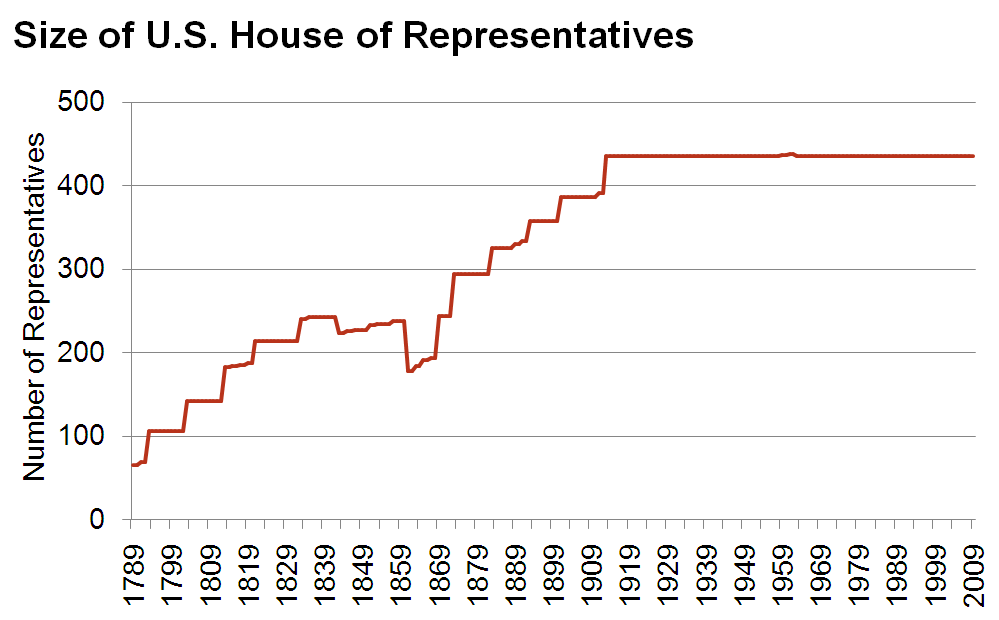Congress sucks, but it doesn’t have to. Or at least it can suck in a more representative, transparent, and balanced way. Here's some issues that I see with Congress as it exists, and my primate brain's way to fix it.
Problem: Dilution of Representation of the American Voter
Today’s political environment shows that the American voter is disconnected from what goes on in Washington and that the people that are suppose to represent the people in the House of Representatives is a shell of what it is designed to be.
Solution: Increase the Size of The House of Representatives to ~1,200
Originally the House was to increase along with population growth, but this was halted in the 1920s as population shifts caused the House to think more about their seats than about how to give representation to the American voter. So expanding the membership of the House should be a straightforward fix. More voices and ideas with a higher emphasis on local communities should make Washington politics more accessible to the average American.
Don’t worry about costs, because you can easily cut the salaries of the members of Congress by more than half to reduce the possible tax increase in growing the House.
 |
| There's a lot of room for salary cuts. |
Problem: Lack of Real Choice
In the majoritarian districts, you can either vote for the candidate that has a shot at winning or you essentially “waste” your vote. There are rarely any moderate, independent, or third party options and you’re forced to vote for the “lesser of two evils.”
Solution: Multi-member Districts with STV Voting Method
Single Transferable Voting is a methodology that applies to multi-member voting districts. In essence it allows for people to vote for all the candidates that they like ranked from most preferable to least. If your top pick isn’t popular enough to gain a seat by reaching a certain percentage, then your vote is transferred to your second choice and so on. This system allows for voters to pick candidates based on their ideas and principles and not solely on party affiliation. The multi-member districts also allow for people that aren’t typically represented to have a voice such as rural liberals and urban conservatives while allowing 3rd Parties and Independents a better chance at competing for a seat.
| What an SVT election looks like |
What the SVT accomplishes in theory is it creates proportionally represented districts that better reflect voter ideals.
Here's a good explainer of the SVT as well.
Problem: Infestation of Special Interests
Like flies on a rotting corpse, lobbyists have devoured our legislative body. Money is poured into congressional campaigns in exchange for favorable treatment even if it goes against the will of the people. This perpetuates the stagnation of Congress and debilitates any action that goes against a strong lobbying group. Yet to ban lobbyists you would have to limit the Constitutional right to petition the government.
Solution: Term Limits & Increased Transparency
In addition to adding new and diverse blood into Congress, term limits would make this a continual and fluid process that also cuts back on entrenched Washington lobbyists being able to fund their selected candidates to victory for countless election cycles. Limiting representatives to 3 two-year terms and senators to 2 six-year terms would be a useful measure in cutting back the power of special interests.
In conjunction with this, a publicly accessible database which would hold funding records and communication transcripts of lobbyist activities should be constructed in order to improve government transparency as well. Citizens should be able to find out which lobbyists are funding their candidates, which would further disincentives shady lobbying practices.
Problem: Lack of State Input in Federal Activity
The original role of the Senate was to be a legislative body that isn’t subject to populism and can check the powers of the Federal government which is a real concern for any group who doesn’t have their preferred party running government.
Solution: Tricameralism
The 17th amendment to the Constitution removes the States’ abilities to appoint Senators, and that’s overall a good thing to have them popularly elected. However there was a point to having the States choose in that it restrained Federal overreaches and is more immune to popularism. Creating a new chamber of Congress, made up of a single delegate from each state chosen by that state’s legislature every 5 years, would help promote State governments in Washington. This being a pseudo-democratic body, it would need to have it’s abilities limited kinda like the British House of Lords. It's role should be focused on reviewing laws and executive orders, while being able to halt legislation with a ⅔ or perhaps ¾ supermajority. It may not need the ability to draft legislation, but it may not be a terrible idea to give the delegates that capability. This would give states a pseudo-veto and a more prominent at the Federal level. It would also be a possible check against the populism that decays many democracies.
I'd call it the Federal Assembly or the Federal Council.
All this will likely never happen and would require something on par with revolution to happen anyway. Congress will continually be dysfunctional, corrupt, and divided between two useless bickering factions.

No comments:
Post a Comment